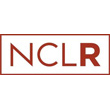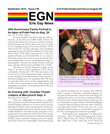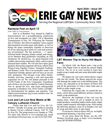NCLR Launches Campaign to Reform State Parenting Laws
(San Francisco, CA, August 11, 2015)—Today, the National Center for Lesbian Rights (NCLR) launched its #Equality4Families campaign to raise awareness about the need to reform state laws so that they fully protect LGBT parents' rights to care for their children.
The campaign launch comes on the heels of the landmark U.S. Supreme Court freedom to marry victory, which brings tremendous progress to the LGBT movement, but does not fully protect all LGBT families, specially parents and their children.
In nearly every state across the country, LGBT parents will continue to face obstacles in caring for their children because state laws have not caught up to the needs of the LGBT community's diverse families. Many families are left vulnerable: parents can lose parental rights as they travel across state lines, may be unable to seek custody of their own children, or may not be afforded the same parental recognition as non-LGBT parents.
"No child should ever lose a parent just because the law refuses to recognize them as a family," said NCLR Family Law Director Cathy Sakimura. "For as long as it takes we will be here, working to bring dignity and full recognition to LGBT parents and their children in every state."
#Equality4Families is being launched to help couples like Julianne and Amy Le Baron, a married couple from Utah, had their children through assisted reproductive technology. They spent thousands of dollars establishing a trust and other documents to protect their children, and on the adoption process for all their kids. Although they are married, without an adoption, their parental relationships may not be respected in every state.
"All we want is for our family to be protected in case something were to happen to one of us. The legal hoops that Amy and I have gone through are not only anxiety-causing, they are extremely expensive," said Julianne Le Baron. "Even though there is marriage equality across the country, we still had to adopt our own children to make sure we are recognized as a family everywhere. The fact that the laws don't fully respect our family makes us feel like our family isn't as worthy as others."
#Equality4Families will educate families about the steps they may still need to take to protect their families and continue our work bringing cases and passing legislation to protect all LGBT families, no matter how they are formed.
NCLR has been at the forefront of family laws since its start in 1977 and has worked to protect our families and relationships one state at a time. NCLR has made key civil rights advances for many families, and we remain committed to advocating for families until every family is fully protected.
PARENTING LAW FACTS
Didn't the U.S. Supreme Court marriage decision automatically protect all families?
Unfortunately not. The Supreme Court decision does a lot to protect LGBT families, but there are still many state laws that need to be updated before all LGBT parents—whether they are married or not – will be recognized by the law.
Why doesn't gaining the freedom to marry protect LGBT parents?
Getting married doesn't necessarily make you a parent to your children under the law. For example, in most states, you have to be married when your children are born to get any parenting protections. Parents who married after their children were born usually have to adopt to protect their rights. Even parents who were married when their children were born may not be fully protected in every state if they are not biological parents. And unmarried non-biological parents remain unprotected in many states unless they adopt.
Why does every state have different laws about families and parenting?
Every state is allowed to make its own family laws. This means that LGBT parents may be legally-recognized in one state, but not in another.
Read more facts and learn more about the campaign.
The National Center for Lesbian Rights is a national legal organization committed to advancing the human and civil rights of the lesbian, gay, bisexual, and transgender community through litigation, public policy advocacy, and public education. www.NCLRights.org



